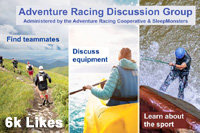Competitors Overcome Obstacles to Compete in U.S. National Championships
Cliff White (ARC) / 11.10.2019

Behind the battle for the overall win at the U.S. Adventure Racing Association National Championship, several other athletes were aiming to score their own personal victories in the race, which took place September 27-28 in Boone, North Carolina.
For Dave Ashley, who won the Masters’ Division (all racers over 45 years old) with the GOALS ARA Masters team, the accomplishment was a way to show what is possible for a recent kidney donor. Ashley donated one of his kidneys to a needy recipient in 2017 and has since gone on to notch a number of both AR- and non-AR related achievements, including climbing Mt. Rainier in Washington and 19,200 foot Mt. Tapacca in Chile, biking the 2,500 miles of the Great Divide Trail from Montana to New Mexico, and finishing the Adventure Race World Series race in September in Croatia.
“I am proof that you can give an organ and still continue to pursue an active lifestyle, even at a competitive level!” he said.
After the race, Ashley announced his funding of a new sponsored entry for the 2020 USARA National Championship.
“I will pay the entry fee for any team that qualifies for the Nationals Adventure Race and has a kidney donor on their team. Typically, the entry fee is $900,” he said. “Additionally, I asked any of the 150+ racers [at the event] and their endurance athlete friends to reach out to me with any questions about kidney donation impacts to a lifestyle of endurance athletics. I already have one person who contacted me who is in the process of getting tested for a donation and has questions.”
Abby Perkiss, of Rootstock Racing, also overcame a significant physical challenge to complete the grueling, 140-mile course. Perkiss gave birth to her second child, Simon, just three months prior to this year’s race.
“Toward the end of my pregnancy, I started thinking that racing Nationals might be a real possibility, depending on how the birth and recovery went. Then, when after 27 hours of labor they told me I needed a c-section, I was pretty sure that window had closed. I'm slightly embarrassed to admit that the last thing that I said to Brent [Abby’s husband], as I was on the operating table, was something to the effect of, ‘I guess I'm not racing nationals after all...’ But I ended up recovering a lot more quickly than I anticipated, and by the time we actually got to the race it felt like enough of a foregone conclusion that I'd be okay that the pregnancy felt like a bit of a non-issue, except for the chronic sleep deprivation and logistics of coordinating childcare support for a three-month-old and a five-year-old,” she said.
Perkiss won the 2017 and 2018 national championships with Rootstock, but stepped back this year onto the team’s secondary squad.
"I was really happy with how I did, especially three months post c-section, and also how we worked together as a team," she said. "And I was so appreciative of the support from the AR community and the offers to hang out with Simon at the post-race banquet!"
Team Chickpoints won their first national championship this year in the female division, which was created three years ago. The team had raced each of those three national championships, but this was the first time team members Karen Clark, Dellvenna Hambling and Kristy Deep had raced together.
“The three of us this year had never all raced together as a team so it was a little unknown but I knew we were a strong team and it was possible for us to win if things went well,” Clark said. “I think we worked really well together – Kristy and I both navigated, we all had input into the planning and recalculating of the route based on how we felt. Dell had never biked that far before but was super-strong. It was a very physical race with not a lot of complicated navigation. We did not know we had won until the end of the race.”
Clark said she chooses to race on an all-female team for both personal reasons and to send a message to women who are interested in trying out adventure racing but who may doubt their own abilities.
“I have raced in co-ed teams and since I wasn't as fast as my teammates, I felt like I was always holding them back. I also love navigating and planning and really didn't get to do that [on co-ed teams]. I also want to see more women in the sport and for them to know they can do this,” Clark said.
Winning the championship was a dream come true, Clark said.
“We were all super-excited. For me, I sometimes wonder how I got there because I know so many super-strong women that could do this and do it better,” she said. “I think all women teams will continue to get better and faster.”
For most racers, finishing fourth would be frustrating, as it usually represents the first position that doesn’t make the podium. For Michael Garrison of Team Deviate, fourth at nationals was a pleasant surprise, as Garrison had just returned from a week of adventure racing on the other side of the world, in Fiji, as part of a team that competed in the reboot of Eco-Challenge.
The nearly 700-kilometer race will be turned into a 10-part series on Amazon Prime called “The World’s Toughest Race: Eco-Challenge Fiji,’ that will premiere in 2020. Garrison flew directly from Fiji to North Carolina for the USARA National Championship.
“For me, the ‘stoke’ was still high after Eco so I was really motivated to race Nationals. It helped not really returning to the real world between the two,” he said. “The biggest challenge (other than sorting through expedition gear for the few things that I needed for a 30-hour race and jet lag) was still respecting the distance. I constantly found myself using the word ‘only’ in front of 30 hours.In fact, I almost packed too little food as I didn't really consider the difference in calorie-burn between expedition pace and 30-hour pace. My concern about slowing the team down was thankfully not as serious as it could have been as I only needed a couple of extra ‘bio breaks’ to deal with jungle guts and the legs were, for the most part, ready to go.”
At the awards ceremony, where his team received the “King of the Mountain” trophy for completing a grueling, 2,500-foot climb on bikes near the end of the race in the fastest time, Garrison addressed the racers gathered to talk about the potential impact the return of Eco-Challenge will have on the sport.
“I wanted to talk to everyone about Eco-Challenge for a couple of reasons. First, I wanted to relay all we heard about what the ‘feel’ of the show was going to be. Obviously, I have no idea how much will be storytelling about racers vs. covering the action on the course, but everyone I talked to that had anything to do with the show stressed that the tone would be more towards documentary storytelling and less towards Survivor-like drama.
"I've been ‘in’ the Eco bubble and that still increased my excitement about the show knowing this was the case. I feel like that approach has a much better chance of enticing people to try AR. Now, a room full of racers does not need televised AR to get them to race more, (although I think it will push a lot of people to expedition racing!). But look at all of their friends and family out a degree or two and I feel like that's a pretty target-rich environment for people that might decide to give our sport a shot after seeing it presented in what is bound to be a visually stunning presentation. I think we would all agree that an influx of new blood would be good for the sport for a variety of reasons.”
Garrison said he is bullish on the impact the show will have in bringing new racers into the sport, which has experienced stagnant growth in recent years.
“Second, I knew a lot of race directors would be there. Who knows how much of a bump the show will give racing, but I wanted them to hear (somewhat) firsthand that the Eco crew are fully committed to this being a successful multi-season show. (Hopefully, the powers that be at Amazon make this happen!) And Bear Grylls has 7.1 million Instagram followers,” Garrison said.
“Put those two things together and the needle is absolutely going to move. How much, who knows. But my hope was that all the people that have put their blood, sweat, tears, and money into AR over the past 15 to 20 years can reap as much of that benefit as possible by riding the social media wave and leveraging the presentation of AR to a whole new audience in their marketing.”






 SleepMonsters
SleepMonsters



